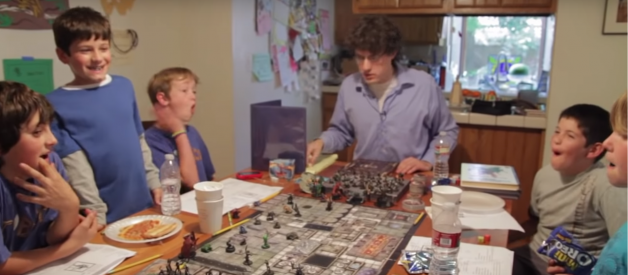 Kids playing DND
Kids playing DND
Let?s face it, it can be tough being a Game Master these days. There are a million things stopping you from getting the crew together for a well deserved campaign. Between finding the time and place, working out everyone?s schedules, gathering the materials (books, dice, and so forth), or in the most dire of circumstances, ensuring you don?t run out of energy drinks in the midst of the deepest dungeon session. It can begin to feel like work and just getting started can seem overwhelming.
Playing tabletop RPGs ONLINE keeps getting easier
Fortunately, with the right tools and processes it?s now easier than ever to explore the vast boundaries of narrative tabletop gaming without leaving your house! Playing tabletop RPGs online can capture an analogous experience ? given the correct process and the proper equipment and without the logistical minefield normally faced in the real world.
Whether you?re a seasoned tabletop Game Master actively playing online, you?re just getting started as a GM, or you?re simply looking for a way to play with some friends, I?ve compiled a list of the ideal steps and tools to getting your online gaming experience underway and maintaining it to the last victory.
Get the logistics straight
I ? Find a Group of Players
If you play regularly with a group of friends, you are in luck, and this step will be fairly simple. If you do not, there are many active forums for DND and PAIZO online, amongst other tabletop forums, to seek out other players. Introduce yourself or make a post for hosting a game. You can also visit local gaming shops in your area to find interested parties. Being active in the community will help tremendously in getting involved in existing games or potentially discovering new friends. Like any relationship, get to know each other and ensure that you can cooperatively ? or competitively ? play together in a positive way.
II ? Communication
Consider who you are playing with. The success of a game is not just organizing it and players participating, but making sure the experience is truly fun. Be prepared to communicate with everyone involved just like they were at the same table. Gauge a few preliminary things before folding out the board:
- Does everyone have the technological capacity to be able to play online?
- When will everyone be available to participate? Can everyone regularly commit to the set dates and times?
- Has anyone played online in the past? If not, can you or any experienced players confidently explain the differences between online and in-person playing?
III ? Decide on the Game Setting
Let?s assume that everyone is on the same page and can actively play online. Next comes perhaps the most important question: which game you and your friends will be playing?
 Eye of the Beholder: The Art of Dungeons & Dragons. Digital image. May 8th, 2019.
Eye of the Beholder: The Art of Dungeons & Dragons. Digital image. May 8th, 2019.
DND?the grandfather of tabletops?is one of the most popular choices for online play. Within the extensive amount of content offered by DND, there is a lot of information to manage, and similarly, some influential questions to examine before getting started.
- Which edition will you be using? Does everyone have access to the rulebooks for this edition?
- Will you be using any homebrew rules? How will you communicate these particulars to your group?
- If you are the Dungeon Master, how do you want to run the campaign, and how will this approach affect the experience? Do you intend on a social atmosphere, or on delivering a harrowing, combative challenge?
 Pathfinder 2 Playtest Cover Art. Digital image. May 8th, 2019
Pathfinder 2 Playtest Cover Art. Digital image. May 8th, 2019
If your expedition is within the Pathfinder world (or comparably, the Starfinder universe), also consider some similar points.
- What scenario or module do you plan on running? Do all players have the information for this available?
- If you are crafting your own adventure path, do you have enough content to provide a substantial gaming experience?
There are many other games that can be played online, from the sci-fi epics of Star Wars and Numenera, to the high fantasy of War of the Ring and A Song of Ice & Fire. Want something with more of a Gothic air? Consider World of Darkness to sate your thirst. Looking for something gritty? Shadowrun imparts cyberpunk inspired gutter-running action. Seeking out something that is horrifically punishing? Try Kingdom Death: Monster (a personal favorite) or the Dark Souls board game.
 Starfinder Core Rulebook Cover Art. Digital image. May 8th, 2019.
Starfinder Core Rulebook Cover Art. Digital image. May 8th, 2019.
The list goes on. Myriad tabletops have survived the years, with many emerging recently, so the search for an immersive setting is far less imposing nowadays. Regardless of the setting, every option should be given the same careful evaluations from the start with the underlying purpose boiling down to having a great time.
Get the tools you need to play your tabletop game online
IV ? Get a Virtual Tabletop
So everyone has agreed on what to play. The next step is crucial to maintaining the fun factor: get a virtual tabletop. While not a necessity ? most games can be played with as little as email and chat ? without this tool, visualizing the game and communicating with your group become grudgingly harder.

Roll20.net is the most prominent virtual tabletop currently available. It is easy to work with, with a compendium of instructions available on their site, and free to use for players. As a game master, the price for hosting is inexpensive. The system can be accessed through most browsers and does not require a dedicated download for use. Strong suits include built-in text, voice, and video; visual dice roller; and a robust community, making creating a game and getting players involved an uncomplicated process.

D20Pro is another satisfying virtual tabletop, particularly for Pathfinder gaming; however, it is not free to use, with licenses for players costing $10 per month and for game masters $30 per month. Learning the system is slightly more complicated than the previous mentions, but for campaigns that necessitate d20-based rules, this option is a solidly built experience.

Fantasy Grounds, available through Steam, provides a suite of licensed gaming options, including the classic DND and Pathfinder experiences alongside the Lovecraftian horrors of Call of Cthulhu, to name just a few. A broad range of add-ons sweeten the package, given its licensing permissions, so referencing rulebooks and bestiaries directly through the program is only a quick venture to the marketplace away. A virtual dice roller, easy to use map builder, and token library round out some of the cooler features. Furthermore, you can avoid subscription pricing by purchasing the app outright.
What Virtual Tabletop should you try first?
Roll20 is likely the best option for getting started with your campaign based on the community size and ease of operations. It is free (an appreciable boon), and a great deal of support for those new to using a virtual tabletop can be easily found through any search engine. I recommend this video by Daelric as a starting point. There is also an extensive help wiki provided on their website. Experiment, test your results, and bring the perils of your sojourn into being.
V ? Get a Campaign Manager
Now that everyone is able to envision the board and relay where the pieces go, it comes time to record what happens upon this tableau; however, between sharing documents and sheets, multitudinous emailing, and keeping up with the campaign in real time, your role as the game master becomes more like going to work than recreation. Like any good boss, you will need a good manager to minimize the rigors of chronicling the details of an adventure from start to finish, especially if you plan on a long-running campaign. Keeping the adventure moving forward in a timely fashion is a major facet of maintaining the fun factor.
Note that some of the features of virtual tabletops and campaign managers can overlap. The key difference between these and campaign managers is analogous to graphics and the coding beneath: campaign managers capture the details of what has happened, what is happening now, and what will potentially happen as the venture progresses (assuming the party decides to leave the obelisk alone.) Statistics, inventory, and the goals of the game are compartmentalized within this tool, making it significantly easier to reference information and make changes on the game master?s end.

Chronica is a newer player in the campaign manager game and offers an expansive list of features to keep everyone up to date, all of which are accessible with any membership level. It is free to join, with a rapidly growing membership, so there are plenty of groups to engage with. One of the best aspects is the system being ?game agnostic,? meaning it can be used for nearly any tabletop available through the use of internal modules. From a game master perspective, it is very user friendly, as it is built by gamers, for gamers. Highlights include built-in group chat; in-depth character information, especially the Kinships feature; and detailed inventory tracking and management, allowing your erasers to survive much longer than usual. As an extra perk, the upper tiers pricing is extremely competitive, permitting up to forty players for games that literally call for an army.

Obsidian Portal is a decent choice for management, granting masters customizable organization based on their preferences. The campaign calendar ensures that all players are on the same schedule, and the adventure tracking features keep the history of the game alive throughout play. Multiple game masters can also help co-manage campaigns through this portal. While easy to use, the system seems increasingly cumbersome and dated, and many of the best elements require subscription or purchase to access.
What Campaign Manager should you try first?
Overall, Chronica is the better of the two aforementioned and worth testing out first. Users gain access to almost all of the features regardless of their level of involvement and the design is a cleaner experience ? a significant element in trying to keep a campaign organized. It?s also brand new as of 2019, meaning the code isn?t getting stale, the user interface isn?t as dated, and the development team seems committed to continuously releasing new features. Not unlike a physical table that would otherwise serve for players to gather ?round, a sensible and usable space is necessary for keeping track of gameplay, which this delivers. A quick introduction can be found here for those who have yet to check it out.
VI ? Don?t Forget the Accessories?
While most of these suggestions will cover your needs for keeping gameplay lively, if features like video chat, dice rolling, readily available rulebooks, and/or music (because how else could you play a bard?) are absent, here are a few additional considerations.
- For video chatting, Discord, Skype and Google Hangouts are all free and efficient solutions, and likely the most commonly used; however, be sure that all players have good internet connections when using video. A triumphant proclamation loses its luster when you only hear every other word.
- There are many dice rolling programs available for free online. While primitive looking, this one provides a good variety of options.
- For rulebooks, be sure that every player has access to the same material. Most system rules are available for free online if the virtual tabletop does not provide them inherently. For DND, consider checking out this site.
- Sound wise, creating a captivating atmosphere is far more effective with the right ambiance. Most voice chats will allow for sharing sounds; alternatively, consider using YouTube live and sharing the direct link. If you do not happen to have a library of sounds, Tabletop Audio offers a wide variety of ?scapes, from jovial taverns to sodden depths.
VII ? Play!
Having gathered your party, you can now venture forth. Let your adventure begin, and remember to have fun.
Conclusion
Playing tabletop games is as fun as ever, but the complexities of life make it difficult to get physical games set up. Fortunately the tools that enable Game Masters to run online campaigns just keep getting better and better and in some ways have made it simpler for anyone to be a Game Master. What are you waiting for?


